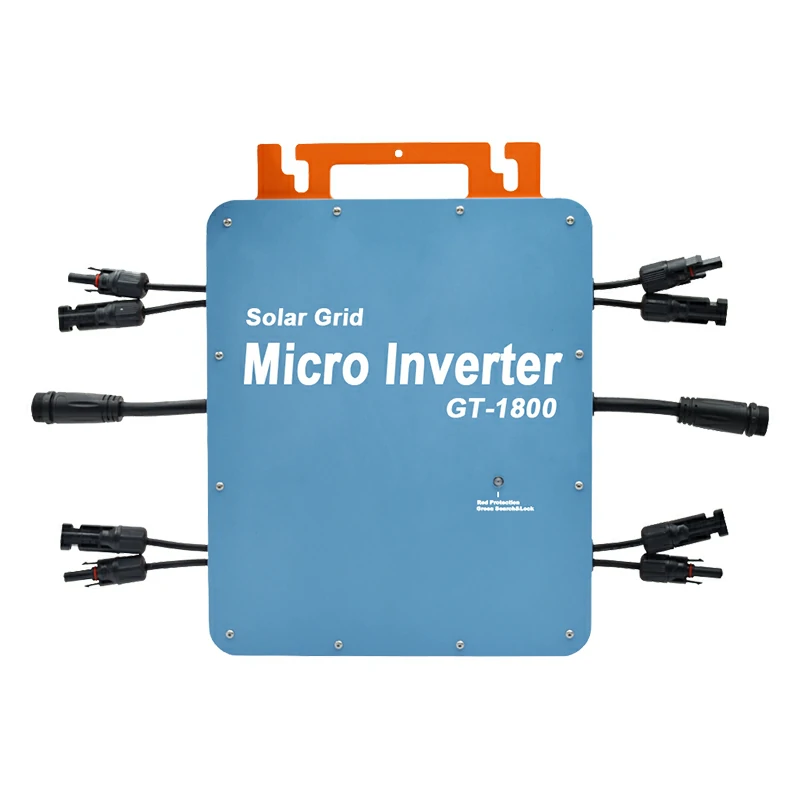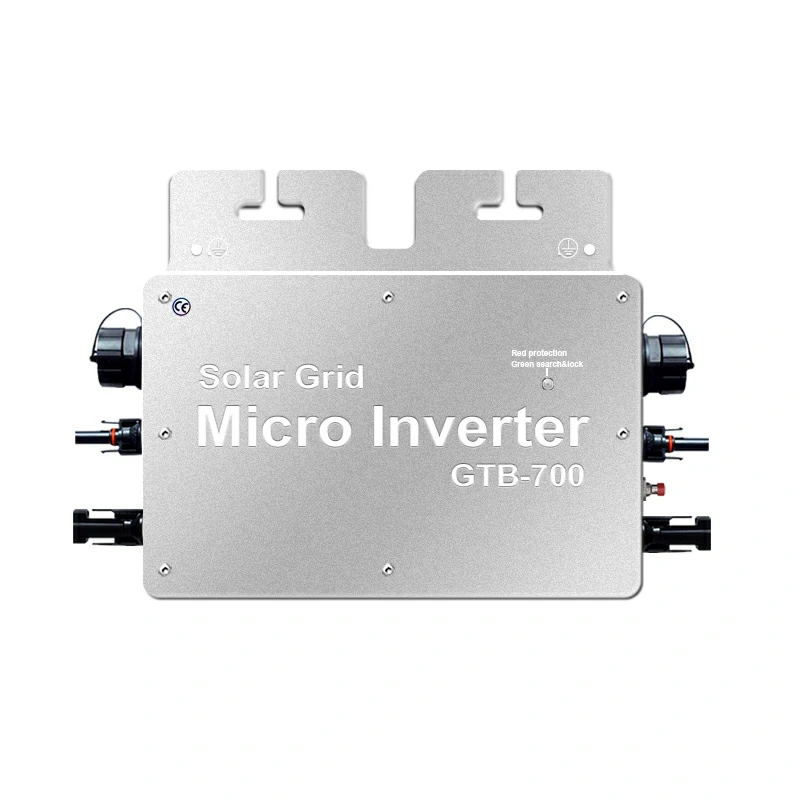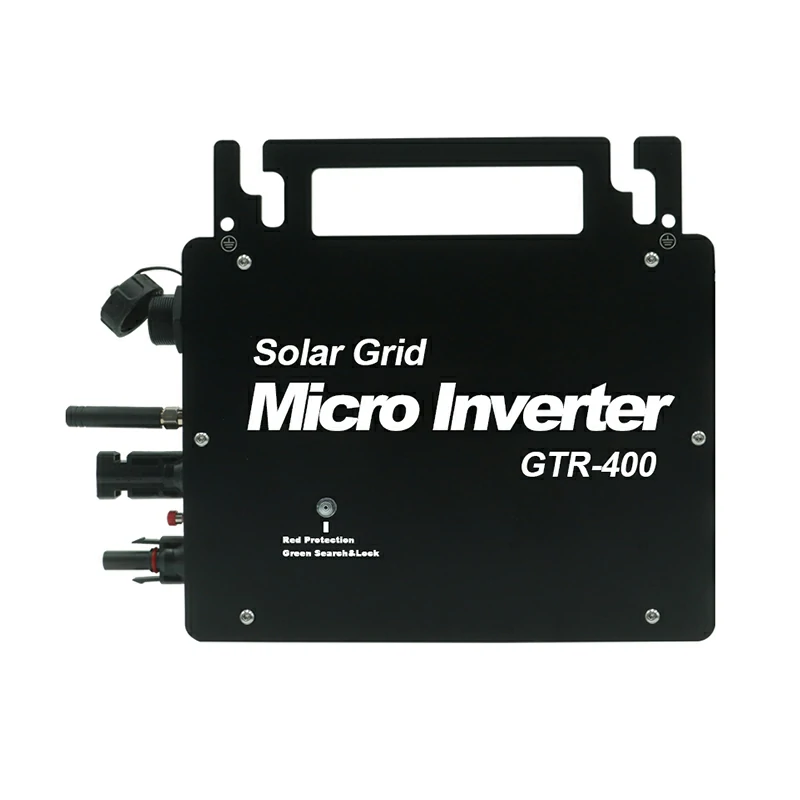Introduction
As the demand for renewable energy continues to grow, solar power systems have become an increasingly popular solution for both residential and commercial use. However, understanding the different types of solar installations and how they utilize Grid-Connected Inverters can be crucial in maximizing efficiency and performance.
This article explores three main types of solar systems—grid-tied, off-grid, and hybrid—highlighting the role of Grid-Connected Inverters and their various applications. Whether you’re looking to invest in a Micro Inverter for your home or exploring options provided by a Micro Inverter manufacturer, this guide will help you navigate your choices.

What Are Grid-Connected Inverters?
A Grid-Connected Inverter is a device that converts the direct current (DC) electricity generated by solar panels into alternating current (AC) electricity, which is used by most household and commercial appliances. What makes these inverters essential is their ability to synchronize with the utility grid, allowing for a seamless flow of energy. If your system produces excess power, it can be fed back to the grid, potentially lowering your utility bill.
One common type of grid-connected inverter is the Micro Inverter. Unlike traditional string inverters that convert the electricity from an entire array of panels, Micro Inverters operate on individual solar panels, providing greater efficiency and monitoring capabilities. Many Micro Inverter manufacturers offer options designed to optimize performance in various conditions, ensuring a reliable energy supply.
Grid-Tied Solar Systems
System Overview
In grid-tied solar systems, the solar panels are directly connected to the electrical grid via a Grid-Connected Inverter. This system is highly efficient for users who have consistent access to the grid, as it allows them to rely on solar energy during the day and switch to grid power when needed.
Role of Grid-Connected Inverters
In grid-tied systems, the Grid-Connected Inverter is crucial. It not only converts DC power to AC but also ensures that any excess energy produced by the solar panels can be fed back into the grid. This system is typically cheaper to install compared to other types of systems because it does not require batteries for energy storage. Micro Inverters can also be used in grid-tied systems to maximize the performance of individual solar panels, especially in locations where partial shading is an issue.
Pros and Cons
Pros:
- Lower initial costs due to no need for battery storage.
- Ability to sell excess energy back to the utility company.
- Simple system maintenance and monitoring, especially with Micro Inverters.
Cons:
- No power during grid outages, as the system depends on the grid for stability.
- Limited to locations with reliable grid access.
Who Should Choose This System?
Grid-tied systems are ideal for homeowners and businesses in areas with reliable utility service. This setup allows users to lower their energy costs while remaining connected to the grid for backup. Additionally, those looking for more efficiency and monitoring capabilities may consider working with a Micro Inverter manufacturer to integrate Micro Inverters into their grid-tied solar system.
Off-Grid Solar Systems
System Overview
Off-grid solar systems operate independently of the utility grid, requiring solar panels, batteries, and inverters specifically designed to handle the entire energy load of the home or facility. In these systems, traditional Grid-Connected Inverters are not used, as they rely on direct connection to the grid. Instead, off-grid systems require standalone inverters and battery banks to store energy for use during periods of low solar production.
Inverter Compatibility
While Grid-Connected Inverters aren’t compatible with off-grid systems, some Micro Inverter manufacturers have begun developing inverters for off-grid use. These devices are tailored to handle specific energy loads and can be more efficient for smaller, modular systems.
Pros and Cons
Pros:
- Complete energy independence from the grid.
- Ideal for remote locations with no grid access.
Cons:
- Higher upfront costs due to the need for battery storage and additional equipment.
- More complex system design and installation.
Who Should Choose This System?
Off-grid systems are ideal for users in remote locations where grid access is unavailable or unreliable. This system is also perfect for individuals or businesses seeking total energy independence. However, it is important to consult with a Micro Inverter manufacturer to ensure the correct inverters are selected for your off-grid system needs.
Hybrid Solar Systems
System Overview
Hybrid solar systems combine elements of both grid-tied and off-grid systems, offering the best of both worlds. These systems are connected to the electrical grid while also having battery storage for backup power. Hybrid systems use a Grid-Connected Inverter to convert solar energy into usable electricity and to manage the flow of energy between the solar panels, the battery storage, and the grid.
Role of Grid-Connected Inverters
In hybrid systems, the Grid-Connected Inverter plays a critical role in managing multiple power sources. It ensures that electricity generated by the solar panels is used efficiently—either to power the home, charge the batteries, or feed excess energy back to the grid. A key advantage of hybrid systems is the ability to store excess energy in batteries for use during grid outages or at night.
Many hybrid systems now employ Micro Inverters, which allow for greater flexibility and system efficiency. With Micro Inverters, the performance of individual solar panels can be optimized, ensuring consistent power generation even if some panels are shaded or malfunctioning. Many Micro Inverter manufacturers provide advanced hybrid inverters designed to manage complex energy flows between solar, battery, and grid power.
Pros and Cons
Pros:
- Ability to store energy for use during grid outages or peak hours.
- Higher efficiency and control over energy usage.
- Reduced dependence on the grid while still being connected.
Cons:
- Higher initial costs due to the need for battery storage and a more complex inverter.
- Requires careful management of energy loads to optimize performance.
Who Should Choose This System?
Hybrid systems are ideal for users who want the reliability of a grid connection but also seek energy independence through battery storage. This setup is especially useful in areas prone to power outages or for those who want to maximize their self-consumption of solar energy. For homeowners and businesses looking to optimize performance, working with a Micro Inverter manufacturer can help ensure that the system meets specific energy demands efficiently.
Factors to Consider When Choosing a Solar System
When deciding which type of solar system to install, there are several important factors to consider:
1. Energy Needs
Evaluate your household or business energy needs, including peak usage times and total consumption. If your energy demand fluctuates significantly throughout the day, a hybrid system with a Grid-Connected Inverter and battery storage might be the best option.
2. Location
Your geographical location plays a significant role in determining the right solar system. Grid-tied systems are more suitable in areas with reliable grid access, while off-grid systems are better for remote locations. Hybrid systems offer flexibility in areas with less reliable utility services.
3. Budget
Budget is another critical factor. Grid-tied systems are typically the most affordable due to the absence of battery storage. Off-grid and hybrid systems are more expensive but offer greater energy independence.
4. Incentives and Rebates
Look into available incentives, rebates, and net metering policies in your region. Grid-tied systems often benefit from net metering, allowing you to sell excess power back to the grid. Hybrid and off-grid systems might qualify for additional renewable energy rebates.
5. Micro Inverters vs. String Inverters
If maximizing efficiency and monitoring is a priority, consider investing in Micro Inverters. They offer better performance in shaded environments and more detailed monitoring of individual panel performance. Many Micro Inverter manufacturers provide solutions tailored to grid-tied, off-grid, and hybrid systems.
Conclusion
Choosing the right solar system—whether grid-tied, off-grid, or hybrid—requires careful consideration of your energy needs, location, budget, and long-term goals. Grid-Connected Inverters play a critical role in all these systems, converting solar energy into usable power and managing its distribution between the grid, batteries, and household appliances. Micro Inverters further enhance the performance and reliability of solar installations, making them a smart choice for users seeking high efficiency and flexibility.
By understanding the unique advantages and drawbacks of each solar system type, and working with a reputable Micro Inverter manufacturer, you can make an informed decision that will meet your energy needs and contribute to a more sustainable future.




